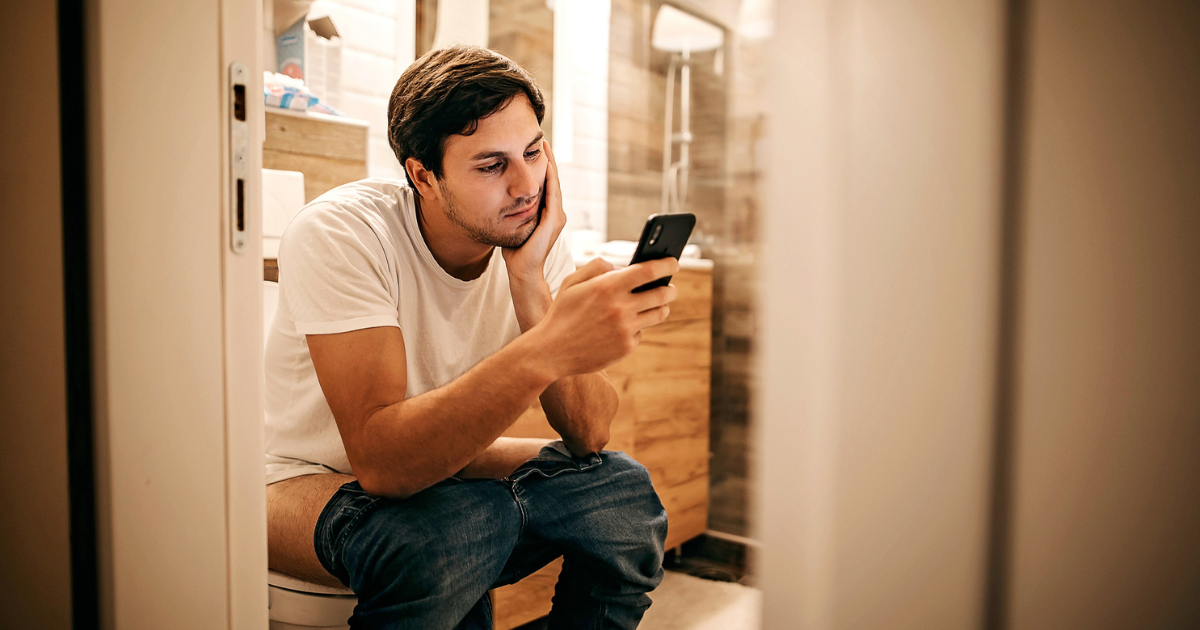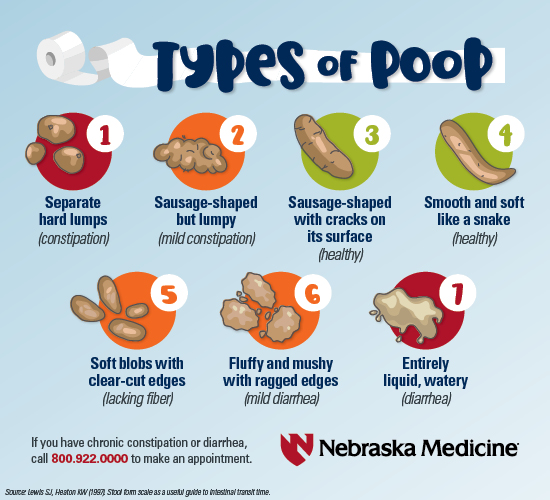What does healthy poop look like?

Healthy poop depends on a number of things. How long it takes you to poop, how often you poop and what your poop looks like are all relevant. Here we walk through the different shapes and colors, along with some tips for healthy digestion.
Types of poop

The Bristol Stool scale shows seven types of poop:
- Type 1: Separate hard lumps (constipation)
- Type 2: Sausage-shaped but lumpy (mild constipation)
- Type 3: Sausage-shaped with cracks on its surface (healthy)
- Type 4: Smooth and soft like a snake (healthy)
- Type 5: Soft blobs with clear-cut edges (lacking fiber)
- Type 6: Fluffy and mushy with ragged edges (mild diarrhea)
- Type 7: Entirely liquid, watery (diarrhea)
Poops that are hard and difficult to pass (Types 1 and 2) indicate constipation. Drinking more water and eating high-fiber foods can ease constipation. Foods high in fiber include beans, nuts, vegetables and fruits.
Poops that are well-formed and easy to pass (Types 3 and 4) are the ideal kinds of poop.
Poops that are entirely liquid or have too much liquid (Types 5, 6 and 7) indicate diarrhea or urgency. Sometimes diarrhea is caused by temporary illness and should pass in a few days. You can follow the BRAT (bananas, rice, applesauce and toast) diet to reduce further GI upset.
Call 800.922.0000 or schedule online to make an appointment with a primary care provider.
Shades of poop
For the most part, poop should be brown. Some of the foods we eat change the color of poop temporarily. But if it's bright red or black, and nothing you've eaten is the culprit, let your doctor know.
- Brown: Any shade of brown is normal and healthy
- Black: Bismuth medications, iron supplements or dark foods like licorice can cause black poop. If none of these ring a bell, or the black color persists, see your doctor
- Green: Hints of green are fine. Green veggies like spinach, iron supplements or antibiotics may cause green poop. But if there's too much green, your stools may be moving too quickly
- Red: If you've had recently eaten something red (think tomato soup or beets), then there's no cause for alarm. But bright red poop could be a sign of bleeding. If you see red that's not from food, call your doctor
- Yellow: This shade of poop is normal for babies who are breastfeeding. But if an adult has yellow poop that's greasy and smelly, tell your doctor
Tips for healthy poop
Gastroenterologist Kathryn Hutchins, MD, offers these tips for better pooping:
- Drink more water. Your body needs water to process foods. Drinking enough water makes poop soft and easier to pass
- Avoid irritating foods. Alcohol, caffeine and spicy foods can trigger your digestive tract. If you're experiencing a lot of loose stools (especially type 6 on the scale), you might try avoiding these foods
- Exercise. Did you know inactivity can increase constipation? Try going for a brisk walk or stretch with some yoga poses to move things along
- Reduce stress. Stress can affect your bowel movements. Minimizing stress at home or work as well as getting plenty of sleep can help your gut health
"The timing matters, too," says Dr. Hutchins. "If you find yourself spending more than 10 minutes on the toilet, that's a sign that you might be constipated."





